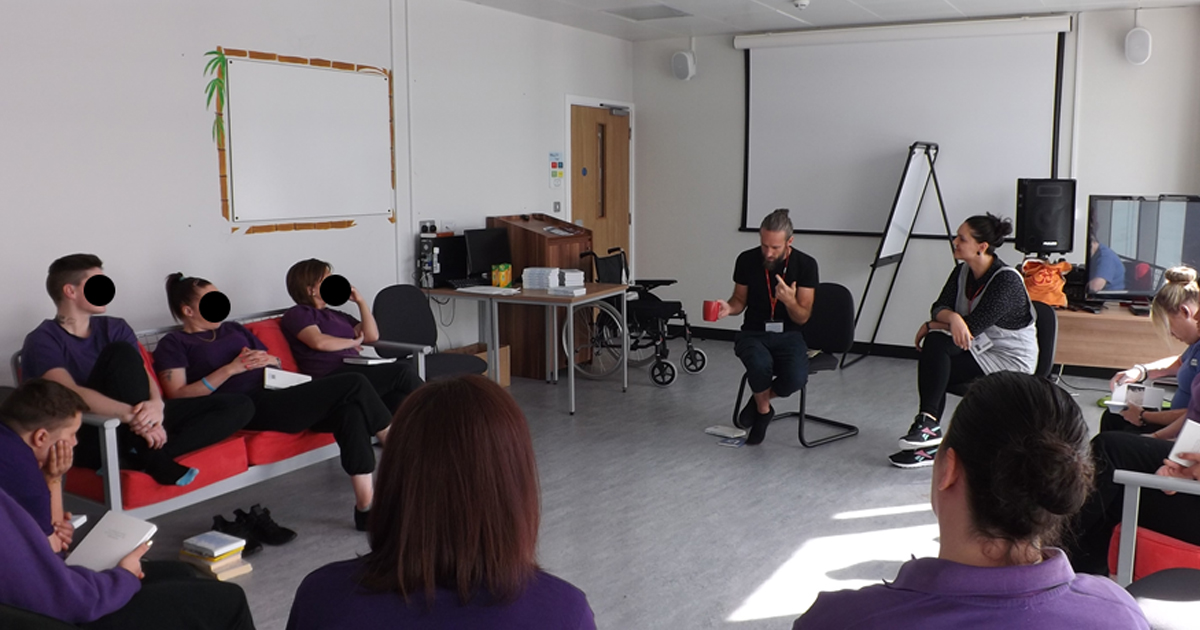The Book Festival Returns to Scotland's Prisons in 2018
Coinciding with the Book Festival in August, we held a series of events in Scotland’s prisons, including some which brought children’s authors into visitor rooms so prisoners could share the experience of a Book Festival event with their families. These sorts of experiences have “been found to be one of the main ways to reduce reoffending when a prisoner is released” (Pam Simpson, HMP Grampian). Following an event for adult prisoners at HMP Grampian in 2017, an attendee said the experience made them ‘feel recognised as human beings’, and this sort of reaction led us to expand the programme to more than 10 events this summer, involving authors including Ben Okri, Debi Gliori and Jason Reynolds. Projects Manager Casi Dylan describes this year's work below.

Once we find ourselves inside a book, there are no boundaries, no bars and no walls. Only the limitless freedom of our imaginations. To share this with other people is one of the best things imaginable.
– Debi Gliori, author & illustrator, who led a family session at HMP Grampian Visitor Room as part of our August 2018 prison programme
The session in the Visitor Room at HMP Edinburgh had been challenging. Many of the families of who had initially signed up for the visit couldn’t make it at the last minute, ‘life getting in the way’. Of the small core who had come along the children were much younger than we had expected, not the age-range for which we had prepared. And so it was that author and illustrator David Roberts, clutching his beautiful book, Suffragette: The Battle for Equality, waiting for his audience to return from the buffet table with polystyrene cups of tea and juice, had to think on his feet. Changing focus, ditching PowerPoint, adjusting tone, he held the interest of those parents and young alike with talent, warmth and wit. One of the mothers would tell us afterwards that is was ‘so good to have this family time’ together, that it was ‘informative, I learned things I didn’t know about.’ But that she had wanted ‘more time.’ Everyone said this. Time was against them. And it’s this, in part, that make the pressure on authors so real in this environment, these briefly reunited families the most exacting of audiences.
By the time David came to repeat his session in the Visitor Room at HMP Perth, he had changed tack. Opting not to present from the front, he spent the entire visit sitting with each individual family in turn, presenting them with a copy of the book, telling them a little about why he had written and illustrated it, sharing some of his best Suffragette facts. All the while he personalised each book with a bespoke illustration. And it didn’t matter that some of the children decided (loudly) to dive into the soft play area. That the young couple with the new-born chose to focus on each other. A balance was held in that strange familial space complemented by the presence of the book and its author. Still, time flew by.
More than ever this year’s programme of prison events highlighted the value of the positive challenges that go hand in hand with working is these environments, and the imperative continually to learn from experience. 2018 was our most ambitious prison programme to date: ten events featuring twelve authors and illustrators across five of Scotland’s prisons. Building on our Visitor Room pilot events last year, three of these sessions were specifically for family audiences and we were delighted to expand this work with each Visitor Centre and the national charity Families Outside to offer tickets to attend Book Festival events in Charlotte Square Gardens too. Thanks to generous benefactor funding, we provided a book to every audience member at each prison event, and a book set to each prison library and Visitor Centre. (‘That means the world to me’, said The Last Poets author Christine Otten after her event at HMP Edinburgh. ‘The fact that books are given shows real respect for the prisoners.’) Coupled with this expansion, and fuelled, no doubt by the Festival’s overarching theme of Freedom, was a commitment to more challenging, ambitious and experimental programming. Matt Hopwood’s A Human Love Story, then, at HMP Grampian. Ben Okri’s Rise Like Lions: Poetry for the Many at HMP Perth. The inimitable Last Poets and Christine Otten at HMP Edinburgh, where they performed and read and listened to some of the prisoners read their own work. A writing workshop on The Character of Voice with long-term prisoners at HMP Shotts, where the book presented to them at the end of their session was the Book Festival’s own publication, The Freedom Papers. In each case it was powerful to see the audience open to the vulnerability which the event invited: they spoke of the love in their lives; read aloud, sometimes stumbling, over Bob Marley lyrics; brought their own voices to bear.
At their most powerful the events manged to feed into, and transform (even if only for a little while) the environments in which they were hosted. The wonderful Visitor Centre teams at both Edinburgh and Perth worked with the families on a Suffragette project in the lead up to David Robert’s events, creating banners, rosettes, badges and bookmarks - creative work which was on display throughout each session. This is a relationship we are committed to developing further, and we are already working with our partners at HMP Shotts to develop such longer-term connections in next year’s programme too, building a project which culminates both within and outwith prison walls during August. But the transformative power of sharing books can also be felt even within the limits of one event. Rachel Kushner’s session on her Man Booker shortlisted novel The Mars Room did just that. Held in the open on the prison wing itself, Rachel’s frank discussion of her novel, the American justice system at its heart, and of comparisons with the Scottish system, filled the space with what felt like an unfamiliar purpose and energy. She asked direct questions of her audience – ‘What’s it like here?’ – which were met with nerves, awkwardness and then frankness, warmth. She swore, she provoked, and every direct question and answer felt like a little act of rebellion and a little act of love. The wing was altered by it. As Jean, the head prison guard, shared with the group: ‘We want these events here, it’s the first one we’ve ever had. We want to show that we can break out of the roles that we’ve built for each other.’
It’s that togetherness, that challenge to the norm, and those little acts of love that stay with you, and which fuel and develop our prison programme every year. As such it feels apt to give the last words to Jason Reynolds, and his dedication in Long Way Down, a book which he shared so memorably with two groups of young men at HMP YOI Polmont this August:
For all the young brothers and sisters
in detention centres around the country,
the ones I’ve seen, and the ones I haven’t.
You are loved.
Share this Post
